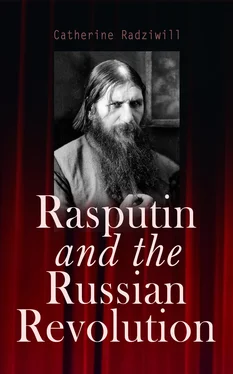Russia was still the land where a court favourite was all-powerful, and Rasputin was held as such, especially by those who had some personal interest in representing him as the successor to Menschikoff under Peter the Great, Biren under the Empress Anne and Orloff under Catherine II. He acquired a far greater influence outside Tsarskoie Selo than he ever enjoyed in the imperial residence itself, and he made the best of it, boasting of a position which in reality he did not possess. The innumerable state functionaries, who in Russia unfortunately always have the last word to say everywhere and in everything and whose rapacity is proverbial, hastened to put themselves at the service of Rasputin and to grant him everything which he asked, in the hope that in return he would make himself useful to them.
A kind of bargaining established itself between people desirous of making a career and Rasputin, eager to enrich himself no matter by what means. He began by playing the intermediary in different financial transactions for a substantial consideration, and at last he thought himself entitled to give his attention to matters of state. This was the saddest side of his remarkable career as a pseudo-Cagliostro. He had a good deal of natural intelligence, and while being the first to laugh at fair ladies who clustered around him, he understood at once that he could make use of them. This he did not fail to do. He adopted toward them the manners of a stern master, and treated them like his humble slaves. At last he ended by leading the existence of a man of pleasure, denying himself nothing, especially his fondness for liquor of every kind. At that time there was no prohibition in Russia and, like all Russian peasants, Rasputin was very fond of vodka, to which he never missed adding a substantial quantity of champagne whenever he found the opportunity.
I shall abstain from touching upon the delicate point of the orgies to which it is related that Rasputin was in the habit of addicting himself, the more so because I do not really believe these ever took place in those higher circles of society where it was said they regularly occurred. That strange things may have happened among the common people, who in far greater numbers than it has ever been known, used to attend the religious meetings which he held, I shall not deny. It must always be remembered that Rasputin belonged to the religious sect of the Khlysty, of whose assemblies we have read the description, and it is quite likely, and even probable, that the assemblies of these sectarians at which he presided were not different from the others to which these heretics crowded. But I feel absolutely convinced that as regards the relations of the adventurer with the numerous ladies of society silly enough to believe in him and in his gifts of prophecy, these consisted only of superstitious reverence on one side and exploitation of human stupidity on the other.
I must once more insist on the point that the apparition of Rasputin in Russian society had nothing wonderful about it, and that the only strange thing is that such a fuss was made. Before his time people belonging to the highest social circles had become afflicted with religious manias of one kind or another out of that natural longing for something to believe in and to worship which lies hidden at the bottom of the character of every Russian who has the leisure, or the craving, to examine seriously the difficult and complicated problems of a future life and of the faith one ought to follow and to believe in.
In 1817 there was discovered in the very heart of St. Petersburg, holding its meetings in an imperial residence (the Michael Palace), a religious sect of most pronounced mystical tendencies, presided over by a lady belonging to the best circles of the capital—the widow of a colonel, Madame Tatarinoff. In her apartments used to gather officers, State functionaries, women and girls of good family and excellent education who, with slight variations, practised all the religious rites of the Khlystys. One of the Ministers of Alexander I., Prince Galitzyne, was suspected of having honoured these assemblies with his presence. Thanks to a letter which accidentally fell into the hands of the police, the Government became aware of what was going on, and Madame Tatarinoff, this Russian Madame Guyon, expiated in exile in a distant province of Siberia the ecstasies which she had practised and which she had allowed others to practise under her roof. Some of her disciples were prosecuted, but the greater number escaped scot free. The authorities did not care to increase the scandal which this affair had aroused in the capital.
Much later, in 1878, after the Russo-Turkish war, which, like the Japanese affair, had been followed by a strong revolutionary movement in the country that culminated in the assassination of the Czar, Alexander II., another prophet, this time of foreign origin, appeared on the social horizon of St. Petersburg society, where he made a considerable number of converts. This was the famous Lord Radstock, whose doctrines were taken up by a gentleman who up to that time had been known as one of the gayest among the gay, a colonel in the Guards—Mr. Basil Paschkoff. He was enormously rich, and put all his vast fortune at the service of the religious craze which had seized him. He used his best efforts to convert to the doctrine of salvation through faith only not alone his friends and relatives, but also the poorer classes of the population of the capital, devoting in particular his attention to the cab drivers. All these people used to meet at his house, where they mingled with persons of the highest rank and standing, such as Count Korff, and a former Minister, Count Alexis Bobrinsky. Later on the whole Tchertkoff family, to which belonged the famous friend of Count Leo Tolstoy, associated itself with them, and, indeed, displayed the greatest fanaticism in regard to its participation in the doctrines of the new sect.
The Paschkovites, as they came to be called, had nothing at all in common with the Khlystys. Their morals were absolutely unimpeachable, and what they preached was simply the necessity to conform one’s morals were absolutely unimpeachable, and what they explained and commented upon, each person according to his own light. They were Protestants in a certain sense, inasmuch as their views were distinctly Protestant ones. But they had much more in common with the nonconformists than the real followers of Luther or of Calvin. They were a kind of refined Salvation Army, if this expression can be forgiven me; though they never acquired the importance, nor did the good which the latter has done, perhaps because they could never make any practical application of the principles and of the ideas which animated them. But at one time the Paschkovist craze was just as strong as the Rasputin one became later on, and Lord Radstock and Mr. Paschkoff were considered just as much prophets among their own particular circle as was Rasputin among the fanatical ladies who had taken him up.
These crises of religious mania are regular occurrences in Russian higher social circles when unusually grave circumstances arrive to shake their equanimity. Seen from this particular point of view, the apparition of Rasputin and the importance which his personality acquired in the life of the Russian upper classes present nothing very wonderful. Before him other so-called prophets had kept the attention of the public riveted upon their doings and their actions.
What distinguished his short passage was the fact that it was made the occasion by the natural enemies of the empire, consisting of the discontented at home, and of the Germans outside the frontier, to discredit the dynasty as well as those whose life was spent in its immediate vicinity and to present this figure of the vagrant half-monk and half-layman, who preached a new relation to those foolish enough to listen to him, as being one of almost gigantic importance, who could at his will and fancy direct the course of public affairs and lead them wherever he wanted.
Читать дальше












